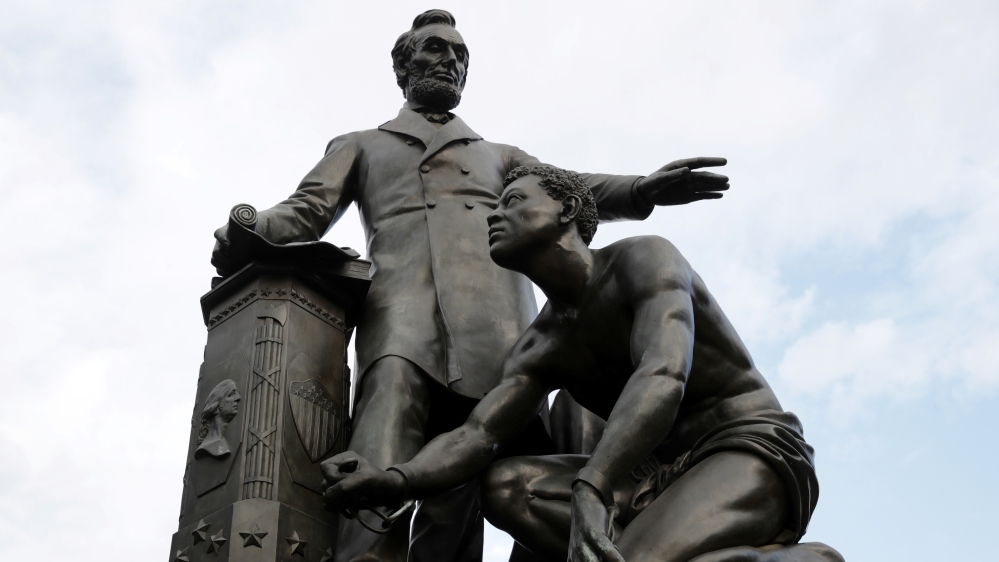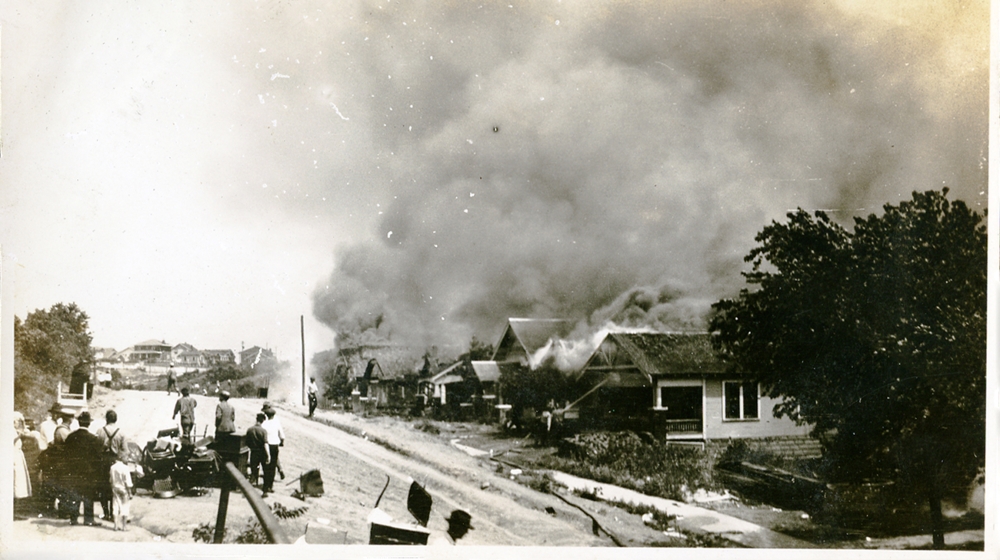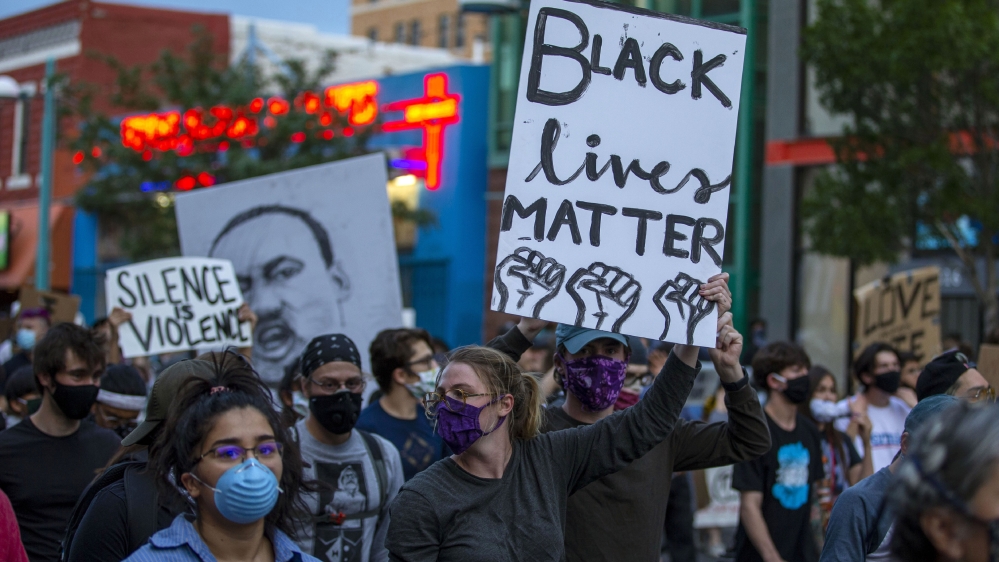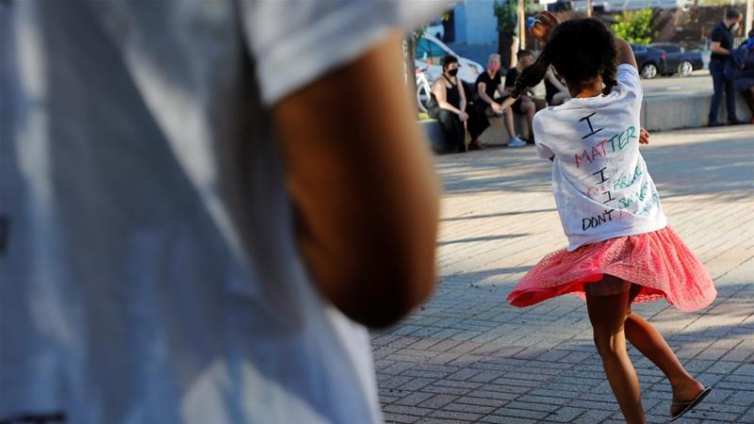In just about any other year, Juneteenth, the holiday celebrating the day in 1865 that all enslaved Black people learned they had been freed from bondage, would be marked by African American families across the nation with a cookout, a parade, a community festival, a soulful rendition of "Lift Ev'ry Voice and Sing".
But in 2020, as the coronavirus ravishes Black America disproportionately, as economic uncertainty wrought by the pandemic strains black pocketbooks, and as police brutality continues to devastate Black families, Juneteenth is a day of protest.
For many white Americans, recent protests over police brutality have heightened their awareness of Juneteenth's significance.
"This is one of the first times since the 60s, where the global demand, the intergenerational demand, the multiracial demand is for systemic change," said Cornell University professor Noliwe Rooks, a segregation expert.
You have changed us forever. Rest in paradise, King. We got this. #BlakeLivesMatter #GeorgeFloyd pic.twitter.com/lWsyvlOQ4J
— Black Lives Matter (@Blklivesmatter) June 9, 2020
"There is some understanding and acknowledgment at this point that there's something in the DNA of the country that has to be undone."
More multiracial
Friday's celebrations will be marked from coast to coast with marches and demonstrations of civil disobedience, along with expressions of Black joy in spite of an especially traumatic time for the nation.
And like the nationwide protests that followed the police-involved deaths of Black men and women in Minnesota, Kentucky and Georgia, Juneteenth celebrations are likely to be remarkably more multiracial.
"I think this year is going to be exciting to make white people celebrate with us that we're free," 35-year-old army veteran David J Hamilton III told The Associated Press news agency.
Hamilton has organised a Juneteenth march and protest through a predominantly Black, Hispanic and immigrant neighbourhood in the Brooklyn borough of New York.
Hamilton, who is Black, said this year is his first treating "Juneteenth with the same fanfare as the Fourth of July or Memorial Day".

Usher Raymond IV, a pop musician with a decades-long career, wrote about the first time he wore a Juneteenth shirt, which had July 4 crossed out.
The date "of independence for our people, Black people, is actually June 19, 1865: the day that the news of the Emancipation Proclamation finally reached some of the last people in America still held in bondage".
In Tulsa, a day before a planned presidential campaign rally on Saturday for Donald Trump, the Reverend Al Sharpton and Tiffany Crutcher, the twin sister of a Black man killed by a city police officer in 2016, plan keynote addresses about the consequences of racial prejudice.

Their commemoration will take place in the Greenwood district, at the site known as Black Wall Street, where dozens of blocks of Black-owned businesses were destroyed by a white mob in deadly race riots nearly a century ago.
In Washington, DC, and around the country, activists affiliated with the Black Lives Matter movement will host in-person and virtual events to celebrate the history of the Black liberation struggle and amplify their calls for defunding police in the wake of high-profile police killings of African Americans.
As of Thursday, organisers with the Movement for Black Lives said they had registered more than 275 Juneteenth weekend events across 45 states, through its website.
Recognition and reparations
Rashawn Ray, a David Rubenstein fellow at the nonprofit public policy Brookings Institution, said many now view Juneteenth as an opportunity for education and to push to dismantle structural racism.
"There's going to be a lot of people who are also going to double down on the push for reparations," Ray said. "There's no reason why Black people have been the only group in the United States to be systematically discriminated against, legally, by the federal government and not receive reparations."
Juneteenth marks the day on June 19, 1865, that Union soldiers told enslaved African Americans in Galveston, Texas, that the Civil War had ended and they were free. The Emancipation Proclamation freed the slaves in the south in 1863 but it was not enforced in many places until after the end of the Civil War in 1865.
The day is recognised in 47 states and the District of Columbia, according to the National Juneteenth Observance Foundation.
Hawaii, North Dakota and South Dakota are the only states without official recognition. And it is not yet a federal holiday. It took roughly 18 years after the assassination of the Reverend Martin Luther King, Jr before his birthday was observed as a federal holiday, on the third Monday in January.
Still, more workers than perhaps ever in history will have the day off on Friday: Nike, the NFL, Twitter and its mobile payments services company Square, along with a handful of media outlets, have announced plans to observe Juneteenth as a company holiday.
New York and Virginia have signed orders recognising Juneteenth as a paid holiday for state employees in recent weeks.
"I think it's time to go further and make it a national holiday. Statues of Confederate generals and racist officials are being toppled all over the country, but we can never erase our painful past with regard to slavery," Alveda King, a Republican politician, activist and niece of Martin Luther King, Jr, wrote in a Fox News opinion article.
"What we can and should do, as Americans of every color, is celebrate its end."
Road ahead
The abolition of slavery in the US was followed by the birth of Jim Crow segregation, relegating many Black Americans to poor, redlined neighbourhoods with under-resourced schools.
Landmark civil rights protections passed in the 1960s were followed by decades of a mass incarceration policy and employment discrimination eroded opportunities and economic stability for Black people.
All along, police brutality has been a fixture for Black people in the US.
Much of the systemic racism and atrocities visited on Black people have gone unanswered. This week, the Equal Justice Initiative, which in 2015 catalogued thousands of racial terror lynchings of Black people by white mobs, added nearly 2,000 Reconstruction-era lynchings confirmed between 1865 and 1876, bringing the total number of documented lynchings to nearly 6,500.

"Our continued silence about the history of racial injustice has fueled many of the current problems surrounding police violence, mass incarceration, racial inequality and the disparate impact of COVID-19," said Bryan Stevenson, director of the Equal Justice Initiative, in a statement.
Latest Stories
-
I am not ready to sign any artiste to my record label – Kuami Eugene
11 mins -
Gov’t spokesperson on governance & security calls for probe into ballot paper errors
14 mins -
Free dialysis treatment to be available in 40 facilities from December 1 – NHIA CEO
28 mins -
NHIA will need GHC57 million annually to fund free dialysis treatment – NHIA CEO
34 mins -
MELPWU signs first-ever Collective Agreement with government
59 mins -
I’ve not been evicted from my home – Tema Central MP refutes ‘unfounded’ reports
1 hour -
After Free SHS, what next? – Alan quizzes and pledges review to empower graduates
2 hours -
Wontumi FM’s Oheneba Asiedu granted bail
2 hours -
Alan promises to amend the Constitution to limit presidential powers
2 hours -
Ghana to face liquidity pressures in 2025, 2026 despite restructuring most of its debt – Fitch
2 hours -
NPP’s record of delivering on promises is unmatched – Bawumia
2 hours -
Mahama: It’s time to dismiss the incompetent NPP government
2 hours -
‘It’s extremely embarrassing’ – Ernest Thompson on Ghana’s AFCON failure
2 hours -
Today’s front pages: Monday, November 25, 2024
2 hours -
T-bill auction: Government misses target again; interest rates continue to rise
2 hours

